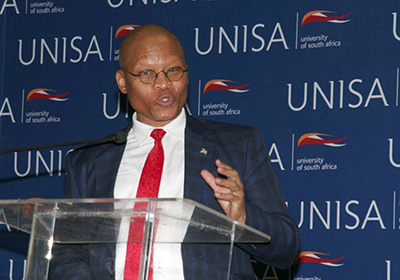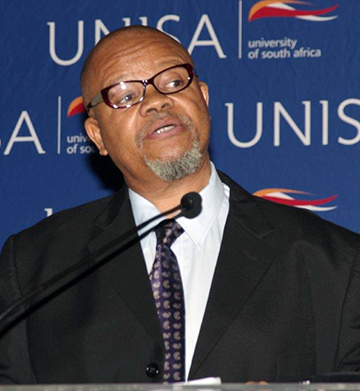Leading change
The time for lip-service on transformation is over—Mogoeng Mogoeng

Justice Mogoeng Mogoeng (Chief Justice: Republic of South Africa) delivered the 2018 Es’kia Mphahlele Memorial Lecture at Unisa.
The 2018 Es’kia Mphahlele Memorial Lecture, held in Polokwane on 28 September 2018, was no ordinary affair. Truth be told, it was arguably one of the best in the series of nine lectures held so far in honour of the celebrated writer, educationist, activist and the father of African Humanism, the late Professor Es’kia Mphahlele. It was simply a festival of ideas second to none.
The Chief Justice of the Republic of South Africa, Justice Mogoeng Mogoeng delivered this year’s lecture, titled Transforming the education system to resolve ‘The National Question’. With an ease reminiscent of his delivery of judgements on the bench and his legendary pastoral orations, he took to the podium like a duck to water. It was vintage Mogoeng Mogoeng.
At the outset, Mogoeng emphasised that ground-breaking transformation begins with a deep-seated hunger for more knowledge, triggered by the realisation that something is very wrong and that essential information about it is missing.
He argued that it is this search, acquisition, and processing of knowledge that ultimately birthed Professor Mphahlele’s philosophy of African Humanism. This Afrocentric worldview, he stated, “proved to be a necessary and potentially effective tool to combat the pernicious effects of western humanism, which really is about the denigration of the African people, casting doubt on their intellectual capacities and their humanity”.
“What Professor Mphahlele clearly wished would never escape the attention of all people who are driven by justice, equity and fairness, was the cold reality that African people were discriminated against, oppressed and exploited so that the West could, while they we watching, take away their wealth and leave them with virtually nothing of consequence,” added the Chief Justice.
Mogoeng put forward the strong argument that the education system is central in the total liberation of a people and transformation of all governance systems. However, he further stated, before it could fulfil that transformative role in a nation that has been marginalised, ignored and exploited, the education system must itself first be transformed.
“Curriculum development must at every level of the system be geared towards decolonising the mind. The self-hate systematically infused in the African people’s way of life must be neutralised and ultimately rooted out,” said the Chief Justice.

Prof Mandla Makhanya (Principal and VC)
This echoed the sentiment expressed by Principal and Vice-Chancellor Professor Mandla Makhanya, in his welcoming address at the beginning of the lecture, during which he stated that “despite the conversations and contestations around the relevant of universities, they remain generators of knowledge, harbours of intellectual endeavour and nurseries for the flourishing of future generations of scholars”. The VC not only argued that universities are tasked with the production of a responsible and critical citizenry, but also that universities cannot do it on their own.
Turning to the question of economic freedom, the Chief Justice was emphatic that the knowledge that political power without economic power is nothing less than a pyrrhic victory demands a curiosity about the structure and essence of this greed-driven economic system and how it has been and continues to be sustained in the developing nations.
He further argued that “transformation is not about giving directorships, shares or even millions of dollars to former freedom fighters so that they can be spokespersons and defenders of their benefactors. It is about undoing injustice, merciless monopolies and mordenised racial discrimination in every walk of life, especially in the education sector”.
In his parting shot, the Chief Justice argued that it was no longer sustainable to blame all the woes of Africa on poor governance and corrupt practices of African leaders. He said that the migration problem is also a contributing factor.
“African people and others from the rest of the developing world leave their countries to go to the West, at great risk to their lives, because that is where their wealth was taken to and continues to be taken to,” he said.
The lecture by the Chief Justice was followed by a discussion with a panel comprised of retired jurist and black consciousness proponent Advocate Mojanku Gumbi and Professor Madipoane Masenya, a professor of Old Testament Studies at Unisa. Ms Khanya Mahlare, Executive Director: Institutional Advancement, facilitated the discussion.
Concurring broadly with the Chief Justice on the subject of decolonisation, Advocate Gumbi emphasised the philosophies enshrined in the great works of leading scholars such as Franz Fanon and Ngũgĩ wa Thiong’o on the subject.
She urged Africans to disregard the narratives developed and propagated by Europeans about them and focus on the objective fact that Africa knew civilization long before the settlers came to our shores.
Mapungubwe is a perfect example of this and when the West was still in dark ages, we were already drinking from ‘china’ and mining and shaping gold, she argued. She added that the first pyramids, the Nubian Pyramids, were built in South Sudan and not Egypt, as the false narrative goes, and this demonstrates that Africans have long conquered science, physics and mathematics.
Advocate Gumbi concluded by advising blacks to stop chasing after whites and begging them to integrate with the rest of us; as they have demonstrated since their arrival on our shores their unwillingness to integrate with us.
“They don’t live with us and they don’t speak any of our languages even after years of residing on our land for so many years,” she argued.
In concurrence with the sentiments expressed by all the other speakers, Professor Masenya pointed to the glaring impact of the country’s colonial and apartheid past. She highlighted that the effects of the previous systems impacted negatively on people of African descent and its effects are visible in all areas of our lives, including in our institutions of higher learning.
“The kind of curricula and offerings at our higher educational institutions continue to bear the scars received from our colonial and apartheid masters and mistresses,” she said.
She advised that the preceding education system should be liberated from the shackles of a Eurocentric value system to the constant regaining of an Afrocentric value system. Furthermore, she argued, the present scenario provided by the South African institutions of higher learning cannot proceed as though it is business as usual; and that there is a definite need for change.
This resonated with Professor Makhanya’s earlier assertion that “we will be the generation that decides if we are the masters of our own destiny or the servants of someone else’s”.
*By Martin Ramotshela
Publish date: 2018/10/17